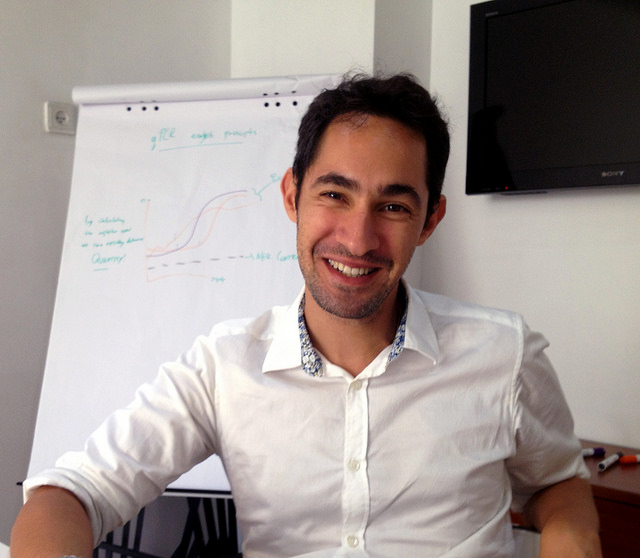Imagine waking up one morning with a cough or a sinus headache. Should you go into the office? Instead of trying to get a doctor’s appointment to find out if you are contagious, you go to the nearest pharmacy for an instant test to determine what kind of virus, bacteria or fungus you may have.
This scenario is not far from becoming reality, thanks to the Jerusalem-based subsidiary of Azure PCR. The company’s disruptive technology has streamlined the process of detecting, diagnosing and tracking infectious diseases.
“This is really important in terms of drug-resistant diseases,” says British-born CEO Aron Cohen, recalling how Muppets founder Jim Henson died in 1990, at age 53, from a drug-resistant bacterial infection before doctors had time to pinpoint the disease strain. “Had he been diagnosed right away, he might still be alive today.”
At this early stage, however, the company is not focusing on that future consumer application but on using its automatic DNA analysis technology in major global collaborations aimed at curbing the spread of viruses such as H1N1 or avian flu, in real time.
Global child health study
Azure PCR is participating in the largest-ever child health study, the Johns Hopkins-based PERCH (Pneumonia Etiology Research for Child Health), bankrolled by the Bill & Melinda Gates Foundation.
This multi-country study of hospitalized pediatric patients with severe pneumonia intends to advance new lab techniques in order to better determine causes and risk factors, as well as guide the development of new vaccines and treatments.
The Israeli company’s role in this $260 million study is its unique capability for fast and automated data analysis.
Cohen tells ISRAEL21c that real-time PCR (polymerase chain reaction) is the most popular molecular diagnostic technique in use today, accounting for more than $2.8 billion in sales.

There are three steps to this process: extracting the DNA from the urine or blood sample, testing the DNA, and analyzing the results. The first two steps were automated before Azure PCR came on the scene.
Their breakthrough is automating the analysis step –greatly speeding up the process, removing the need for specially trained technicians (a particularly acute issue for developing countries where skilled professionals can be hard to find) and eliminating room for error in interpreting results.
“We make the subjective objective,” says Cohen, who founded the company with CTO Ze’ev Russak. “We can provide standardized results without the need for skilled personnel.”
Disease early-warning system
The ability to provide near-instant answers could enable much faster appropriate treatment for everyday maladies such as respiratory or urinary infections.
More globally, it could allow future pandemics to be managed using immediate information rather than almost useless data from two or three days earlier.
Automated analysis provided by Azure PCR can be fed into a database to help world health authorities stay on top of deadly disease outbreaks.
“With major global pandemics such as SARS and swine flu, we saw a six- to 18-month lag in diseases that start in developing nations until spreading to the West, so being able to track these in real time can make prevention through vaccination and other methods possible,” Cohen explains.
“Putting early warning systems in place can improve people’s lives and cut down on the cost of universal healthcare. If we know there is a disease spreading from a town and can map its distribution patterns, targeted vaccination can prevent it from spreading. Prevention is always better than cure.”
Since 2010, Azure PCR has worked with institutions such as Harvard Medical School and the UK government’s National Health Service hospitals to validate their method’s accuracy for diagnosing swine flu, hepatitis B and many other viral and bacterial diseases.
“We’ve tested over half a million samples,” says Cohen, “and we are in the process of putting together articles for publication in peer-reviewed scientific journals, along with a number of partners.”
The company is also working with laboratories to demonstrate how its technique can reduce the amount of labor that goes into analysis, thereby reducing the cost of testing, Cohen tells ISRAEL21c.
“We are showing labs that they can make more money by using our technology, and this will provide our early-stage revenues.”
The company leaders expect that as studies are published and uptake increases, there will be a knock-on effect in an industry where arguably reputation is everything.
“We want to be a company that will increase access to molecular diagnostics to improve human health,” says Cohen. “We want to take it out of the lab and put it in the hands of users.”














